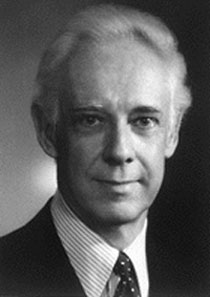Stanford Moore facts for kids
Quick facts for kids
Stanford Moore
|
|
|---|---|
 |
|
| Born | September 4, 1913 |
| Died | August 23, 1982 (aged 68) |
| Nationality | U.S. |
| Alma mater | Vanderbilt University University of Wisconsin–Madison University School of Nashville |
| Known for | Ribonuclease |
| Awards | Nobel Prize in Chemistry in 1972 |
| Scientific career | |
| Fields | Biochemistry |
| Institutions | Rockefeller University |
| Thesis | The identification of carbohydrates as benzimidazole derivatives (1938) |
| Doctoral advisor | Karl Paul Link |
Stanford Moore (September 4, 1913 – August 23, 1982) was an American biochemist. A biochemist studies the chemistry of living things. He won a Nobel Prize in Chemistry in 1972. He shared this award with two other scientists, Christian B. Anfinsen and William Howard Stein. They received the prize for their important work on an enzyme called ribonuclease.
Moore and his team worked at Rockefeller University. They studied the structure of ribonuclease. They also helped us understand how its chemical shape affects what it does. This work was a big step in understanding how enzymes work in our bodies.
Contents
Early Life and Education
Stanford Moore was born in Chicago, Illinois. He went to school at Peabody Demonstration School. This school is now known as University School of Nashville.
In 1935, he finished his studies at Vanderbilt University. He then went on to earn his doctorate degree. He studied organic chemistry at the University of Wisconsin–Madison. He received his doctorate in 1938.
Career and Discoveries
After finishing his studies, Moore joined the Rockefeller Institute. This place later became Rockefeller University. He spent his whole career there. During World War II, he worked for the government for a short time. In 1952, he became a Professor of Biochemistry.
Automated Amino Acid Analyzer
In 1958, Stanford Moore and William H. Stein created something amazing. They developed the first machine that could automatically analyze amino acids. Amino acids are the building blocks of proteins. This new machine made it much easier to figure out the order of amino acids in proteins. This order is called a protein sequence.
Understanding Ribonuclease
Just one year later, in 1959, Moore and Stein made another big announcement. They were the first to figure out the complete amino acid sequence of an enzyme. This enzyme was ribonuclease.
This discovery was very important. It helped scientists understand how enzymes work at a very detailed level. Their work on ribonuclease was a key reason they won the Nobel Prize in 1972.
See also
 In Spanish: Stanford Moore para niños
In Spanish: Stanford Moore para niños
 | John T. Biggers |
 | Thomas Blackshear |
 | Mark Bradford |
 | Beverly Buchanan |

